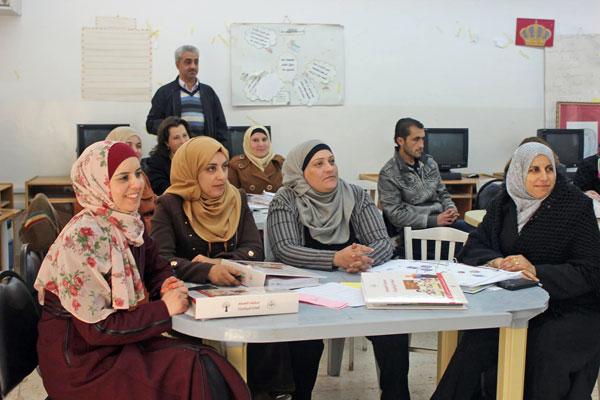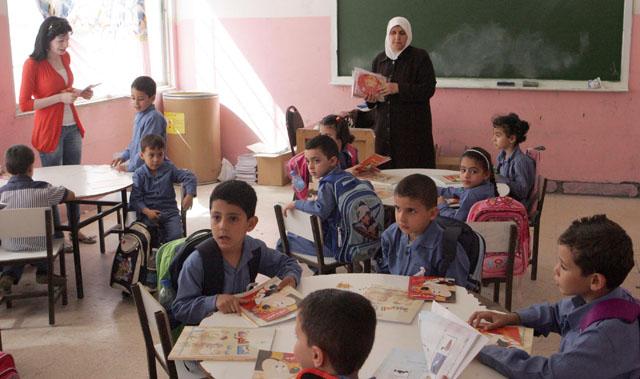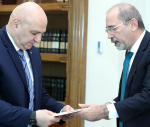You are here
‘Project to enable 55% of early graders to master reading, basic math skills by 2019’
By Laila Azzeh - Feb 16,2016 - Last updated at Feb 16,2016

Local, British and US officials speak to students at Al Shaimaa Primary Coeducational School, one of the schools where the Early Grade Reading and Mathematics Initiative is being implemented (Photo courtesy of USAID)
AMMAN — By 2019, around 55 per cent of early graders in public school will be able to read with comprehension and do mathematics with understanding — two departments in which students used to perform “very poorly”.
Under the Early Grade Reading and Mathematics Initiative (RAMP), a $48-million project funded by the US and the UK, more than 400,000 students at 2,500 government-run schools will be targeted over a course of five years to improve their reading and mathematics skills.
“Some will be disappointed. Why only 55 per cent? Why not 100 per cent? Well, the issue is that 55 per cent will be an enormous achievement when we know that there were only 13 per cent of children who were able to read with comprehension and do mathematics with understanding in 2012,” said expert Aarnout Brombacher.
Brombacher cited a USAID-funded study conducted in 2012 that showed that the vast majority of early grade students were found to lack fundamental reading and mathematics skills.
The study also showed that only one in five second and third graders were reading with comprehension and that children were unable to perform basic mathematical functions with real understanding, depending instead on memorisation.
The findings of the study have prompted the Education Ministry in cooperation with the USAID to carry out a one-year pilot programme that has managed to change the status quo in the schools it was applied in.
In only one year, the intervention project managed to double the number of children reading with comprehension and performing mathematics with understanding, according to the results of an assessment survey conducted to measure the outcomes of the programme.
The project significantly reduced the proportion of the lowest performers and increased the proportion of the highest performers among students in the targeted schools, USAID said at a ceremony to announce the results in 2014.
The number of students reading with comprehension increased from 12 per cent in 2012 to 24 per cent, while the number of students doing mathematics with understanding increased from 14 per cent to 24 per cent.
The outcomes of the intervention plan have inspired stakeholders to initiate RAMP, which was officially launched by Her Majesty Queen Rania last April.
The project, led by the Education Ministry and implemented by RTI International in partnership with other local and international organisers, targets students from KG2 to grade three.
RAMP works on achieving its goals through improving learning materials, preparing teachers to provide effective reading and mathematics instruction, engaging communities for participation in the education of students, and supporting the government in its endeavours to institutionalise early grade reading and mathematics policies.
“Parents and people do not always understand what we mean when we say reading with comprehension and doing mathematics with understanding,” Brombacher said on Tuesday during a ceremony to launch the slogan of the initiative “I Read the Book, I understand Mathematics”.
He explained that when children first learn to read, they read at different stages, with the first being able to read familiar words (often the context gives the meaning to the words).
“At this stage children know words as pictures and often early instructions are about introducing children to pictures. Now the problem with that approach is that our minds run out of the capacity to remember more pictures and if reading relies on memorising the pictures,” Brombacher said.
“After grade two or three, we will not be able to read anymore because our vocabulary has increased to several thousand words,” he noted, adding that the same applies to mathematics when children first learn to count as a song without understanding.
“These are very important first stages for reaching and understanding mathematics, but children do not get beyond this stage; they are in trouble,” stressed the expert, underlining the importance of reading to children at home in improving their skills.
Nearly 14,000 teachers will receive training under RAMP within five years.
“Witnessing the improvement and character development of my students after applying the activities I was trained on through the initiative was overwhelming,” said Mervat Waleed, a second grade teacher at Al Shaimaa Primary Coeducational School.
With students from around 90 nationalities currently receiving education in Jordan’s public schools, Nawaf Ajarmeh from the Education Ministry attributed the overall “poor” performance of early graders in basic comprehension skills to the size of classrooms.
“The influx of Syrian refugees alone has resulted in the enrolment of 145,000 Syrian students, and around 40,000 new ones are expected to join public schools by the start of the coming scholastic year,” he noted.
“The real reform of education starts from the early grades, taking into account that education is a social responsibility that all partners and stakeholders should work together to realise... successfully. The Ministry of Education has the lead role in raising awareness about the initiative and educating the public on its benefits,” said the ministry’s secretary general, Mohammad Okour.
Commenting on the RAMP initiative, USAID Mission Director Jim Barnhart stressed his country’s commitment to continuing support for the education sector in Jordan.
“Education has always been a priority for the Hashemite leadership and is a cornerstone of the United States’ commitment to Jordan’s prosperity. The ministry’s reading and mathematics initiative represents a firm and deep commitment to improving the academic performance of all children in Jordan,” Barnhart said.
Jeffrey Tudor, head of office at the UK Department for International Development, said: “Education is one of the best investments that a country can make in its future economy and society, and it is well proven that investing in the early stages of a child’s schooling is one of the most effective investments of all.”
“The UK stands shoulder to shoulder with Jordan, committed to Jordan’s stability and economic prosperity and the well-being of its children,” Tudor added.
Related Articles
AMMAN — An early educational intervention programme is changing teachers, students and parents’ attitudes towards learning.“I can now engage
After the vast majority of early grade students were found to lack fundamental reading and mathematics skills in 2012, a one-year experimental programme has managed to change the status quo in the schools it was applied in.
AMMAN — The Ministry of Education has completed a four-day training for principals of public schools with kindergarten 2 to grade 3 classes


















